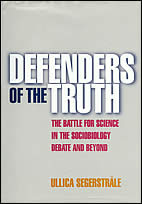Defenders of the Truth. The Battle for Science in the Sociobiology Debate and Beyond de Ullica Segerstråle
 Comentaba hace unos días el libro Dawkins vs. Gould que trataba sobre la lucha de esos dos gigantes de la divulgación y ahora me encuentro con un libro que cubre un territorio aún mayor, la guerra de la sociología que se desató hace ya más de un cuarto de siglo y cuyos ecos siguen resonando en nuestro presente.
Comentaba hace unos días el libro Dawkins vs. Gould que trataba sobre la lucha de esos dos gigantes de la divulgación y ahora me encuentro con un libro que cubre un territorio aún mayor, la guerra de la sociología que se desató hace ya más de un cuarto de siglo y cuyos ecos siguen resonando en nuestro presente.
In the summer of 1975 the distinguished Harvard entomologist Edward O. Wilson published his Sociobiology: The New Synthesis. In the book, Wilson defined sociobiology as the new discipline devoted to «the systematic study of the biological basis of all social behavior». HE explicitly included our own species Homo sapiens, and devoted his final chapter to humans, suggesting that human sex role divisions, aggressiveness, moral concerns, religious beliefs, and much more, have a genetic basis. The book came under intense fire from a group of critics and battle lines were drawn. In one notable incident, some three years after the book’s publication, Wilson, about to speak at a symposium sponsored by the American Association for the Advancement of Science, had a jug of water poured over his head by a groupo of hecklers. The sociobiology controversy was in full swing.
Defenders of the Truth is the definitive account of the controversy, a fascinating tale involving clashes of convictions about science and its social role. But Segerstråle canvas is on a altogether grander scale. Here is an engrossing insight into the world of science and the scientist who inhabit it. Here, too, are important scientific, moral and political issues, and perennial themes such as the objectivity of science, the social use of scientific knowledge, human nature, and free will. Some of these themes have recently resurfaced in conjunction with the Human Genome project and the so-called Science Wars.
The key participants described have all been interviewed and studied by the author, at the time when the controversy was at its height, and more recently. They include Edward O. Wilson, Richard Lewontin, and Stephen Jay Gould, the Harvard scientists at the heart of the controversy when it first erupted, and, from the «British connection», John Maynard Smith y Richard Dawkins. «The characters in my story», writes Ullica Segerstråle, «are all defenders of the truth -it is just that they have different conceptions of where the truth lies.»
Por cierto, al final ganó la psicología evolutiva 🙂